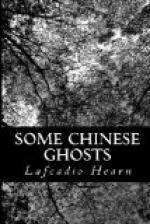BY LAFCADIO HEARN
Copyright, 1887, by Roberts brothers
* * * * *
To my friend Henry Edward Krehbiel
THE MUSICIAN
Who, speaking the speech of
melody unto the
children of tien-HIA,—
unto the wandering tsing-jin,
whose skins
have the color of gold,—
moved them to make strange
sounds upon the
serpent-bellied San-Hien;
persuaded them to play for
me upon the
shrieking ya-Hien;
prevailed on them to sing
me A song of their
native land,—
the song of MOHLI-hwa,
the song of the jasmine-flower
[Illustration: Line drawing of a man’s head]
* * * * *
PREFACE
I think that my best apology for the insignificant size of this volume is the very character of the material composing it. In preparing the legends I sought especially for weird beauty; and I could not forget this striking observation in Sir Walter Scott’s “Essay on Imitations of the Ancient Ballad”: “The supernatural, though appealing to certain powerful emotions very widely and deeply sown amongst the human race, is, nevertheless, a spring which is peculiarly apt to lose its elasticity by being too much pressed upon.”
Those desirous to familiarize themselves with Chinese literature as a whole have had the way made smooth for them by the labors of linguists like Julien, Pavie, Remusat, De Rosny, Schlegel, Legge, Hervey-Saint-Denys, Williams, Biot, Giles, Wylie, Beal, and many other Sinologists. To such great explorers, indeed, the realm of Cathayan story belongs by right of discovery and conquest; yet the humbler traveller who follows wonderingly after them into the vast and mysterious pleasure-grounds of Chinese fancy may surely be permitted to cull a few of the marvellous flowers there growing,—a self-luminous hwa-wang, a black lily, a phosphoric rose or two,—as souvenirs of his curious voyage.
L.H.
New Orleans, March 15, 1886.
CONTENTS
THE SOUL OF THE GREAT BELL
THE STORY OF MING-Y
THE LEGEND OF TCHI-NIU
THE RETURN OF YEN-TCHIN-KING




